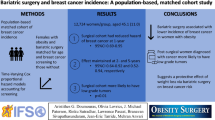Abstract
Introduction
Obesity has a known association with certain types of malignancy, and we aimed to determine whether bariatric surgery has a protective effect against de novo obesity-associated cancer development in adult patients.
Methods
We performed a multi-center retrospective cohort studying utilizing TriNetX national database. Patients were identified utilizing ICD-10-CM coding, and propensity score matching was performed. We compared patients with obesity who underwent bariatric surgery to patients with obesity who did not undergo bariatric surgery.
Results
We initially identified 60,285 patients in the bariatric surgery group and 1,570,440 patients in nonsurgical control group. After propensity score matching, we included 55,789 patients in each patient cohort. The cumulative incidence of de novo obesity-associated cancers at 10 years was 4.0% (2206 patients) in the bariatric surgery group and 8.9% (4,960 patients) in the nonsurgical control group (HR 0.482 [95% CI 0.459–0.507]). The bariatric surgery group had lower incidence proportions for de novo breast cancer (HR 0.753 [CI 0.678–0.836]), colon cancer (HR 0.638 [CI 0.541–0.752]), liver cancer (HR 0.370 [CI 0.345–0.396]), ovarian cancer (HR 0.654 [CI 0.531–0.806]), and endometrial cancer (HR 0.448 [CI 0.362–0.556]) when compared to the nonsurgical control group.
Conclusion
We noted that bariatric surgery is associated with a significantly lower cumulative incidence of de novo obesity-associated cancer compared to a nonsurgical matched control group. Incidence proportions of de novo breast, colon, liver, ovarian, and endometrial cancer were significantly lower in adult patients with obesity in the bariatric surgery group compared to the nonsurgical group.
Graphical Abstract

Similar content being viewed by others
References
Lauby-Secretan B, Scoccianti C, Loomis D, et al. Body fatness and cancer--viewpoint of the IARC Working Group. N Engl J Med. 2016;375(8):794–8.
Arterburn DE, Telem DA, Kushner RF, et al. Benefits and risks of bariatric surgery in adults: a review. JAMA. 2020;324(9):879–87.
Schauer DP, Feigelson HS, Koebnick C, et al. Bariatric surgery and the risk of cancer in a large multisite cohort. Ann Surg. 2019;269(1):95–101.
Aminian A, Wilson R, Al-Kurd A, et al. Association of bariatric surgery with cancer risk and mortality in adults with obesity. JAMA. 2022;327(24):2423–33.
Sjöström L, Gummesson A, Sjöström CD, et al. Effects of bariatric surgery on cancer incidence in obese patients in Sweden (Swedish Obese Subjects Study): a prospective, controlled intervention trial. Lancet Oncol. 2009;10(7):653–62.
Elixhauser A, Steiner C, Harris DR, et al. Comorbidity measures for use with administrative data. Med Care. 1998;36(1):8–27.
Author information
Authors and Affiliations
Corresponding author
Ethics declarations
Ethics Approval
This article does not contain any studies with human participants or animals performed by any of the authors. For this type of study, formal consent is not required.
Informed Consent
Informed consent does not apply.
Conflict of Interest
The authors declare no competing interests.
Additional information
Publisher’s Note
Springer Nature remains neutral with regard to jurisdictional claims in published maps and institutional affiliations.
Key Points
- Adult patients with obesity who underwent bariatric surgery compared with no bariatric surgery had a decreased cumulative incidence of de novo obesity-associated cancer.
- Incidence proportions of de novo breast, colon, liver, ovarian, and endometrial cancer were significantly lower in adult patients with obesity in the bariatric surgery group compared to the nonsurgical group.
Supplementary Information
ESM 1
(DOCX 19 kb)
Rights and permissions
Springer Nature or its licensor (e.g. a society or other partner) holds exclusive rights to this article under a publishing agreement with the author(s) or other rightsholder(s); author self-archiving of the accepted manuscript version of this article is solely governed by the terms of such publishing agreement and applicable law.
About this article
Cite this article
Chittajallu, V., Mansoor, E., Perez, J. et al. Association of Bariatric Surgery with Risk of Incident Obesity-Associated Malignancies: a Multi-center Population-Based Study. OBES SURG 33, 4065–4069 (2023). https://doi.org/10.1007/s11695-023-06926-3
Received:
Revised:
Accepted:
Published:
Issue Date:
DOI: https://doi.org/10.1007/s11695-023-06926-3




